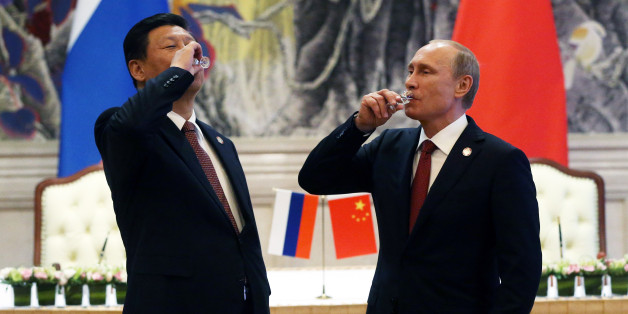....As mi ah tell unnu from jump....The trends are not in the West's favor. A long, slow decline is in full effect.
Buckle up
The Era of American Global Dominance Is Over
09/15/2016 07:15 pm ET
Graham E. Fuller
Former vice chairman, CIA’s National Intelligence Council

You might recall the term “Eurasia” from high school geography classes. The term isn’t used much anymore in political discussions in the West, but it should be. That is where the most serious geopolitical action is going to be taking place in the world as we move deeper into the 21st century.
The U.S., focused so intently on “containment“ of Russia, the so-called Islamic State and China, will be missing the bigger Eurasian strategic picture.
Eurasia is the greatest landmass of the world, embracing Europe and all of Asia — some of the oldest and greatest centers of human civilization.
The more Washington attempts to contain or throttle Eurasianism as a genuine rising force, the greater will be the determination of states to become part of this rising Eurasian world.
The significance of the term “Eurasian” has changed a good deal, but it still suggests strategic rivalry. At a time when the U.S. formally declares its intent to militarily dominate the world (“full spectrum dominance“ was the official Pentagon doctrine in 2000) the concept of Eurasianism is responding with vigor.
And not just in China, but in its new significance for countries like Russia, Iran and even Turkey. It suggests a sense of the eclipse of dominant western power in the face of new Asian power.

Buckle up

The Era of American Global Dominance Is Over
09/15/2016 07:15 pm ET
Graham E. Fuller
Former vice chairman, CIA’s National Intelligence Council

You might recall the term “Eurasia” from high school geography classes. The term isn’t used much anymore in political discussions in the West, but it should be. That is where the most serious geopolitical action is going to be taking place in the world as we move deeper into the 21st century.
The U.S., focused so intently on “containment“ of Russia, the so-called Islamic State and China, will be missing the bigger Eurasian strategic picture.
Eurasia is the greatest landmass of the world, embracing Europe and all of Asia — some of the oldest and greatest centers of human civilization.
The more Washington attempts to contain or throttle Eurasianism as a genuine rising force, the greater will be the determination of states to become part of this rising Eurasian world.
The significance of the term “Eurasian” has changed a good deal, but it still suggests strategic rivalry. At a time when the U.S. formally declares its intent to militarily dominate the world (“full spectrum dominance“ was the official Pentagon doctrine in 2000) the concept of Eurasianism is responding with vigor.
And not just in China, but in its new significance for countries like Russia, Iran and even Turkey. It suggests a sense of the eclipse of dominant western power in the face of new Asian power.


